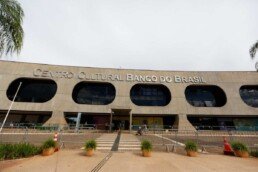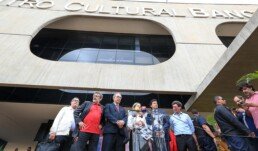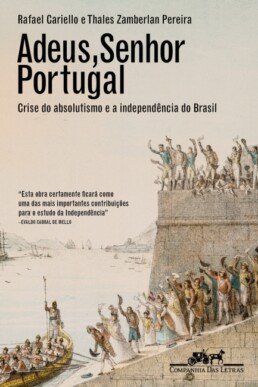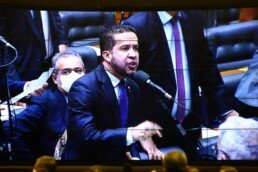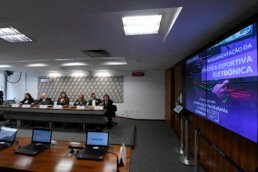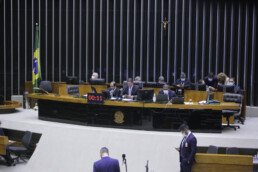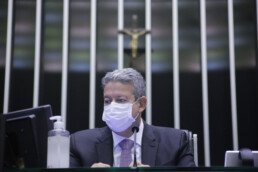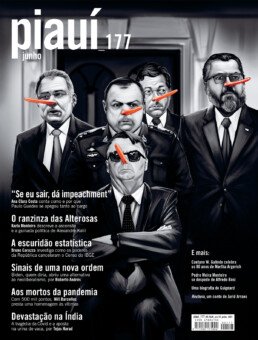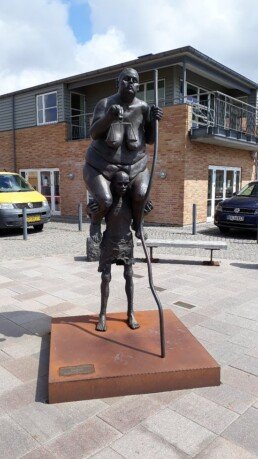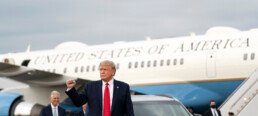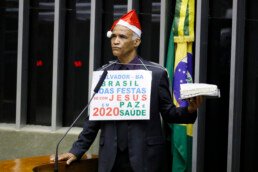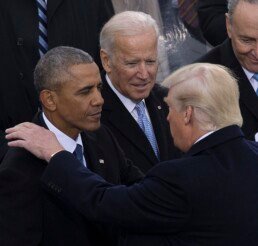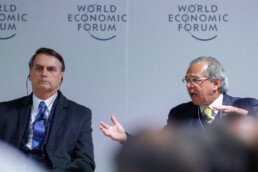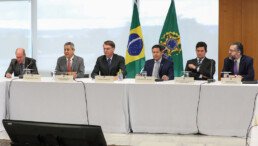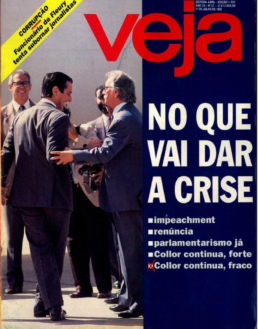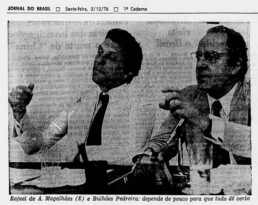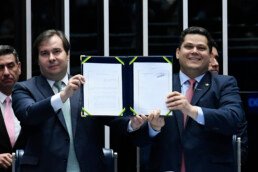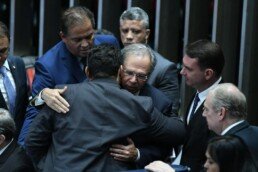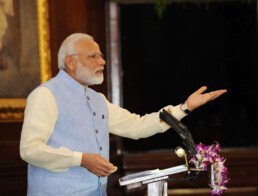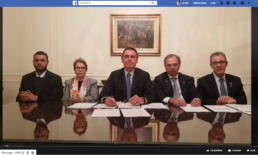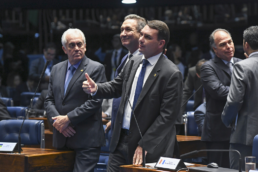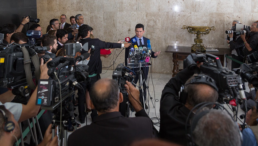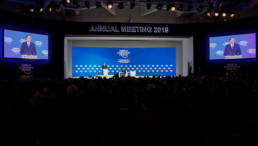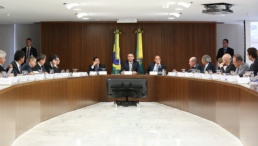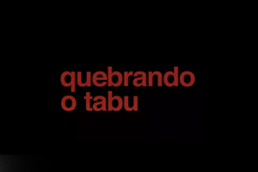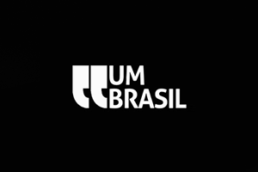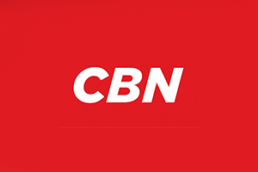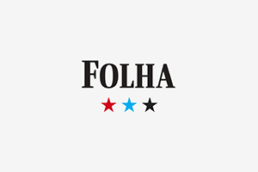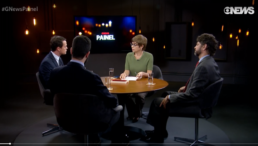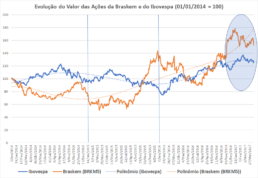The books under consideration here, written by the cream of Brazilian public intelligentsia and influential foreign analysts, are part of an emerging struggle to understand the turmoil of the recent past and how Brazil reached its worrisome present.
Published online by Cambridge University Press: 02 January 2022
Abstract
This essay reviews the following works:
Democracia em risco? 22 ensaios sobre o Brasil hoje. By Sérgio Abranches and twenty-three others. bold>São Paulo: Companhia das Letras, 2018. Pp. 328. R$69.90 paperback. ISBN: 9788535932027.
Presidencialismo de coalizão: Raízes e evolução do modelo político brasileiro. By Sérgio Abranches. bold>São Paulo: Companhia das Letras, 2018. Pp. 434. R$69.90 paperback. ISBN: 9788535931556.
Brazil Apart: 1964–2019. By Perry Anderson. bold>London: Verso, 2019. Pp. 224. $21.56 hardcover. ISBN: 9781788737944.
Dinheiro, eleições e poder: As engrenagens do sistema político brasileiro. By Bruno Carazza. bold>São Paulo: Companhia das Letras, 2018. Pp. 324. R$69.90 paperback. ISBN: 9788535931259.
Valsa brasileira: Do boom ao caos econômico. By Laura Carvalho. bold>São Paulo: Todavia, 2018. Pp. 192. R$49.90 paperback. ISBN: 9788593828621.
Coalitional Presidentialism in Comparative Perspective: Minority Presidents in Multiparty Systems. By Paul Chaisty, Nic Cheeseman, and Timothy J. Power. bold>Oxford: Oxford University Press. US$85.00 hardcover. ISBN: 9780198817208.
O lulismo em crise: Um quebra-cabeça do período Dilma (2011–2016). By André Singer. bold>São Paulo: Companhia das Letras, 2018. Pp. 392. R$54.90 paperback. ISBN: 9788535931150.
A batalha dos poderes: Da transição democrática ao mal-estar constitucional. By Oscar Vilhena Vieira. São Paulo: Companhia das Letras, 2018. Pp. 233. R$49.90 paperback. ISBN: 9788535931815.
As Bruno Carazza points out in his smart, empirically grounded, and accessible study of the relationship between money and politics, there is plenty of reason for the political system to be worried by any corruption investigation. Low party identification, personalistic politics, and the foibles of the electoral system contributed to boosting politicians’ demand for campaign finance, while businesses’ interest in building political influence drove them to supply campaign donations ever more generously. The “umbilical connection” between the economic and political elite (76) generated a cycle of donations and favors, with fewer than five hundred donors accounting for three-fifths of formal corporate contributions between 1994 and 2014. Furthermore, Lava Jato made clear that formal donations were just the tip of the iceberg: plea-bargaining Petrobras official Paulo Roberto Costa suggested that two-thirds of campaign finance was illegal and under the table (via the so-called caixa dois); in his plea bargain, Marcelo Odebrecht suggested the ratio for his eponymous construction firm might be closer to three-quarters (35). On the supply side, the courts have now banned corporate donations, but there was no accompanying institutional change that would significantly reduce demand for campaign resources, suggesting that the incentives that contributed to the Lava Jato wrongdoing remain largely intact (243). Tragically, under the Rousseff, Temer, and Bolsonaro administrations, key political parties and incumbents have periodically managed to set aside their squabbles long enough to unite against many meaningful anticorruption reforms that would correct these perverse incentives (264).
Leia na íntegra: https://www.cambridge.org/core/journals/latin-american-research-review/article/coalitions-corruption-and-crisis-the-end-of-brazils-third-republic/A53F069DB24574BE3EDA1A592CC9E1C5
COMPARTILHE EM SUAS REDES
MAIS ANÁLISES
16 de dezembro de 2022
Qual o preço de uma maioria no Congresso?
9 de dezembro de 2022
Haddad é Lula e Lula é Haddad
2 de dezembro de 2022
Maldições da transição
25 de novembro de 2022
Lula na mão de Lira
18 de novembro de 2022
O difícil quebra-cabeças do ministério de Lula
11 de novembro de 2022
O Centrão vai embarcar no governo Lula?
4 de novembro de 2022
O retorno da fênix, mas pode ser o canto do cisne
28 de outubro de 2022
Segundo turno entre a lógica e a matemática
21 de outubro de 2022
Em cada urna um recado para Lula e Bolsonaro
14 de outubro de 2022
O novo Congresso é mais conservador ou mais bolsonarista?
7 de outubro de 2022
Ganhadores e perdedores do primeiro turno
30 de setembro de 2022
O que esperar da última semana antes da eleição
23 de setembro de 2022
O voto também está mais caro em 2022
16 de setembro de 2022
As pistas do uso do Fundão nas eleições 2022
9 de setembro de 2022
De Dom Pedro para Lula e Bolsonaro, de coração
2 de setembro de 2022
Como ficará o Senado em 2023?
26 de agosto de 2022
Sinais de um Congresso ainda mais conservador
19 de agosto de 2022
Na rua, na TV, no rádio e nas redes sociais
12 de agosto de 2022
Lula vence o segundo round das eleições
5 de agosto de 2022
Receita nº 5 para ser eleito: ser famoso
29 de julho de 2022
Receita nº 4 para ser eleito: ter contatos com a elite
15 de julho de 2022
Receita nº 2 para ser eleito: ser parente ou amigo
1 de julho de 2022
O que esperar do primeiro ano de um eventual governo Lula
24 de junho de 2022
Chico, Dorothy, Dom, Bruno e as outras 307 vítimas
17 de junho de 2022
Na República da desigualdade imperfeita
10 de junho de 2022
Haddad será o novo Genoino?
3 de junho de 2022
As bolhas de indiferença nas eleições brasileiras
20 de maio de 2022
O poder ultrajovem na disputa Lula x Bolsonaro
6 de maio de 2022
O que Janones tem a ensinar sobre a política
29 de abril de 2022
Em busca das ovelhas desgarradas
22 de abril de 2022
A disputa pelo Nordeste vermelho
15 de abril de 2022
Lula pesca no seu próprio aquário
8 de abril de 2022
Bolsonaro sai na frente em primeiro round da disputa eleitoral
3 de abril de 2022
Valdemar e Jair
25 de março de 2022
Não é questão de ego, mas de estratégia
18 de março de 2022
Assim na terra como no céu
12 de março de 2022
Guedes não quer guerra com ninguém
25 de fevereiro de 2022
Esperando a janela
14 de fevereiro de 2022
Política e videogames
7 de fevereiro de 2022
Namoros, casamentos e traições
31 de janeiro de 2022
Disseram que eles não vinham, olhem eles aí
24 de janeiro de 2022
Os blefes de Bolsonaro
17 de janeiro de 2022
Os ventos da mudança
10 de janeiro de 2022
A mosca azul ronda o ministério de Bolsonaro
3 de janeiro de 2022
Mais sacrifícios, menos soluções mágicas
27 de dezembro de 2021
A elite e seu próprio umbigo
20 de dezembro de 2021
Presentão de Natal antecipado
13 de dezembro de 2021
Para inglês ver
6 de dezembro de 2021
O Senado e o povo
29 de novembro de 2021
A esquerda que enxerga além
22 de novembro de 2021
De Marina para Moro
10 de novembro de 2021
O que indica o discurso de filiação de Moro
8 de novembro de 2021
Ideias ruins e promessas vazias
1 de novembro de 2021
O lero-lero como política pública
25 de outubro de 2021
A responsabilidade de quem carrega o piano
18 de outubro de 2021
O arco do fracasso
11 de outubro de 2021
Uma agenda de baixo para cima
4 de outubro de 2021
Contagem regressiva
26 de setembro de 2021
Muita água a passar por debaixo da ponte
20 de setembro de 2021
As conexões e interferências sobre o 5G brasileiro
13 de setembro de 2021
Dinheiro, política e democracia
6 de setembro de 2021
A matemática da crise
30 de agosto de 2021
Reforma tributária não dá voto
16 de agosto de 2021
Extorsão e traição
9 de agosto de 2021
Medalha, medalha, medalha
2 de agosto de 2021
Na idade da pedra lascada
26 de julho de 2021
Fé cega, faca amolada
19 de julho de 2021
Uma reforma “fabulosa”
12 de julho de 2021
Por que escolhemos os piores?
5 de julho de 2021
Cartas na mesa
28 de junho de 2021
Já é um começo
21 de junho de 2021
Uma guinada de 360 graus
14 de junho de 2021
A arte de empurrar com a barriga
7 de junho de 2021
A bússola
3 de junho de 2021
“CERTO PERDESTE O SENSO!”
31 de maio de 2021
A voz das ruas
24 de maio de 2021
Bolsonaro, porcos e sardinhas
17 de maio de 2021
Nuvem de palavras
10 de maio de 2021
A escuridão no fim do túnel
3 de maio de 2021
A volta dos que não foram
2 de maio de 2021
Às cegas
2 de maio de 2021
Bancarrota blues
17 de abril de 2021
Quando a esmola é muita
15 de abril de 2021
Criatividade e psicologia a favor da vacinação
9 de abril de 2021
Vai sair barato
2 de abril de 2021
Janela discreta
26 de março de 2021
Rt baixo
19 de março de 2021
Mais próximo do que se imagina
12 de março de 2021
São todos coniventes
11 de março de 2021
Nem 1989, nem 2002: está de volta o Lula 2006
5 de março de 2021
Governar é inaugurar estradas
26 de fevereiro de 2021
Chicago losers
12 de fevereiro de 2021
Realidades paralelas
5 de fevereiro de 2021
Dinheiro na mão é vendaval
29 de janeiro de 2021
Cheiro de reforma no ar
22 de janeiro de 2021
Vacina contra a incompetência
15 de janeiro de 2021
O tribunal do Facebook
8 de janeiro de 2021
Na surdina
8 de janeiro de 2021
Nossas vidas nunca mais serão as mesmas
8 de janeiro de 2021
Saúde, paz, união… e reforma tributária
18 de dezembro de 2020
A sobrevivência dos mais gordos
11 de dezembro de 2020
São muitos os Brasis
11 de dezembro de 2020
O mapa da mina
28 de novembro de 2020
“Si hay gobierno, estoy a favor”
20 de novembro de 2020
Em busca de sinais
13 de novembro de 2020
Trump 2024
10 de novembro de 2020
Governando do Além-Túmulo
10 de novembro de 2020
Quem dá mais, leva: o poder econômico nas eleições
30 de outubro de 2020
Dando nome aos bois
27 de outubro de 2020
O plano decenal de Guedes
23 de outubro de 2020
Siga o dinheiro
22 de outubro de 2020
TSE deveria abrir o olho com certos institutos de pesquisa
9 de outubro de 2020
Como as economias morrem
9 de outubro de 2020
Vai dar liga?
9 de outubro de 2020
Procurando agulha no palheiro
9 de outubro de 2020
Chovendo no molhado
11 de setembro de 2020
Panteras Negras
3 de setembro de 2020
Finalmente, a Reforma Administrativa
28 de agosto de 2020
Não faço mais previsões
21 de agosto de 2020
Perdido em campo
15 de agosto de 2020
Meu pai presente
7 de agosto de 2020
Sobre homens e bichos
4 de agosto de 2020
O nióbio é nosso!
31 de julho de 2020
A aula da Professora Dorinha
31 de julho de 2020
A carta
30 de julho de 2020
Lobby das igrejas leva mais uma
30 de julho de 2020
A hora e a vez do lobo-guará
17 de julho de 2020
Lições do Mobral
15 de julho de 2020
Um risco nem um pouco “Simples”
10 de julho de 2020
“O povo” contra Zuckerberg
4 de julho de 2020
Os números estarão certos desta vez?
3 de julho de 2020
Bolsonaro e as máscaras
1 de julho de 2020
Vem aí a Análise de Impacto Regulatório
30 de junho de 2020
Desviando o dinheiro dos velhinhos
30 de junho de 2020
Artistas receberão R$ 3 bilhões, só não sabem quando
26 de junho de 2020
Delírios e delícias
25 de junho de 2020
Saiba o que pode mudar nas redes sociais com o PL das fake news
24 de junho de 2020
STF suspende portaria sobre agrotóxicos
23 de junho de 2020
O que está em jogo no PL do Saneamento?
19 de junho de 2020
Change partners
18 de junho de 2020
O futebol parou, mas a Bancada da Bola continua jogando sujo
12 de junho de 2020
Vem aí uma enxurrada de ações judiciais
12 de junho de 2020
De João 8:32 ao art. 211 do Código Penal
5 de junho de 2020
70 contra 30
29 de maio de 2020
Todos os homens do presidente
23 de maio de 2020
Os “melhores” momentos do vídeo da reunião ministerial
22 de maio de 2020
Nau à deriva
21 de maio de 2020
Finalmente um acordo sobre a Lei Kandir
15 de maio de 2020
O powerpoint, os tweets e os guarda-costas
14 de maio de 2020
A MP do Libera-Geral
8 de maio de 2020
O mundo mudou, o Brasil nem tanto
8 de maio de 2020
No que vai dar a crise?
8 de maio de 2020
Não existem mocinhos e bandidos
8 de maio de 2020
O antes e o depois de Bolsonaro
10 de abril de 2020
O futuro será sombrio
3 de abril de 2020
Um novo 7 a 1?
2 de abril de 2020
O Programa Emergencial de Manutenção do Emprego
27 de março de 2020
VUL-nerabilidade
20 de março de 2020
O grande flagelo
20 de março de 2020
O que querem as mulheres?
6 de março de 2020
Viver é muito perigoso
5 de março de 2020
A Super Tuesday e os Rumos da Eleição Americana
5 de março de 2020
A corrida do ouro nos EUA
20 de fevereiro de 2020
O incrível caso do governador que deu um tiro no pé
18 de fevereiro de 2020
Mais um episódio da série “Problemas complexos, soluções simples… e erradas”
15 de fevereiro de 2020
Luz e escuridão
7 de fevereiro de 2020
O funcionalismo não é mais aquele?
7 de fevereiro de 2020
Não podemos importar propina
5 de fevereiro de 2020
Street-level lobby
4 de fevereiro de 2020
Flávio Dino e Eduardo Leite, dois nomes para ficar de olho
24 de janeiro de 2020
Férias numa colônia penal
24 de janeiro de 2020
(Des)continuidades
24 de janeiro de 2020
Agenda complexa em ano eleitoral
24 de janeiro de 2020
Sobrevivemos (?)
27 de dezembro de 2019
Sob pressão
20 de dezembro de 2019
Happy new Years and Years
20 de dezembro de 2019
Poço sem fundo
6 de dezembro de 2019
Para Rodrigo e Davi
6 de dezembro de 2019
Mudou, mas continuou quase igual
22 de novembro de 2019
Não se iluda, Bolsonaro também é uma ideia
15 de novembro de 2019
Shutdown à brasileira
8 de novembro de 2019
Feelings
6 de novembro de 2019
O novo regime fiscal de Paulo Guedes
1 de novembro de 2019
A hora do sim é um descuido do não
25 de outubro de 2019
Do limão à limonada
18 de outubro de 2019
Entre privilégios e vantagens
11 de outubro de 2019
A batalha final
4 de outubro de 2019
A estratégia por trás do veto
27 de setembro de 2019
Veta, presidente!
20 de setembro de 2019
Pizza com caipirinha
13 de setembro de 2019
O teto ameaça desabar
6 de setembro de 2019
Eminência pálida
30 de agosto de 2019
Em bom português
23 de agosto de 2019
Mano a mano hemos quedado
21 de agosto de 2019
3 Decretos e a Nova Correlação de Forças na “Cozinha” de Bolsonaro
20 de agosto de 2019
Viciado em likes
20 de agosto de 2019
O fim do Coaf
9 de agosto de 2019
“Curvo-me diante de ti”
8 de agosto de 2019
Melhor prevenir do que remediar
8 de agosto de 2019
Partidos clandestinos
26 de julho de 2019
De Campos a Guedes
25 de julho de 2019
Conheça as novas regras sobre o cadastro positivo
25 de julho de 2019
Contra o aumento do fundo eleitoral
12 de julho de 2019
A solidão do corredor de longa distância
5 de julho de 2019
Maus conselhos
28 de junho de 2019
O Supremo poder moderador
21 de junho de 2019
Esperando ajuda de cima
14 de junho de 2019
Democracia de Facebook
10 de junho de 2019
Suprema irresponsabilidade
31 de maio de 2019
O novo dono do pedaço
24 de maio de 2019
O novo presidencialismo
17 de maio de 2019
Na terceira temporada, o fim?
10 de maio de 2019
O lobby a favor do lobby
8 de maio de 2019
Análise das propostas em pauta para regular o lobby
8 de maio de 2019
Lula e a esquerda sem projeto
28 de abril de 2019
Política Pública baseada em Evidências Eleitorais
19 de abril de 2019
A agenda microeconômica é para os fortes
18 de abril de 2019
Dois órgãos oficiais, duas línguas diferentes
16 de abril de 2019
O “revogaço” de Onyx e seus possíveis efeitos inesperados
14 de abril de 2019
Muitas novidades no Diário Oficial
8 de abril de 2019
O show do trilhão
1 de abril de 2019
Muita conversa e pouco conteúdo
29 de março de 2019
Novas regras para concursos públicos
27 de março de 2019
Governo desidrata Conselho Curador do FGTS
25 de março de 2019
Acabou a lua de mel
18 de março de 2019
Governo exige ficha limpa para cargos comissionados
18 de março de 2019
Robin Hood dos morros, reis da malandragem?
16 de março de 2019
Mais uma derrota do governo: a PEC 02/2015
15 de março de 2019
O STF errou em relação aos crimes eleitorais
13 de março de 2019
Sobre Milícias, Discursos e Medalhas
13 de março de 2019
Governo corta mais de 21 mil funções e gratificações
12 de março de 2019
(Des)Igualdade Política entre os Gêneros no Brasil – Continuação
11 de março de 2019
O triste cenário das mulheres na política
9 de março de 2019
(Des)Igualdade Política entre os Gêneros no Brasil
25 de fevereiro de 2019
Não se iludam, não vai ser fácil
18 de fevereiro de 2019
Precisamos olhar além do laranjal
11 de fevereiro de 2019
Expectativas e sinalizações no combate à corrupção
6 de fevereiro de 2019
A Mensagem Presidencial Enviada ao Congresso
4 de fevereiro de 2019
O novo Congresso dá as suas caras
3 de fevereiro de 2019
Eleições para as Presidências do Senado e da Câmara
28 de janeiro de 2019
De Davos a Brumadinho
24 de janeiro de 2019
Presidentes Brasileiros em Davos
24 de janeiro de 2019
Mudanças na Lei de Acesso à Informação
21 de janeiro de 2019
Davos: Passagem de Ida e Volta
16 de janeiro de 2019
Bolsonaro e os Cargos Comissionados
14 de janeiro de 2019
Sobre regulamentos, cargos e simbolismos
4 de janeiro de 2019
Comparando os Ministérios de Bolsonaro e Temer
3 de janeiro de 2019
O Coaf nos tempos de Moro
2 de janeiro de 2019
A nova estrutura do Poder Executivo na gestão Bolsonaro
13 de dezembro de 2018
Eleições virtuais
21 de novembro de 2018
Superministério ou o pior emprego do mundo?
9 de novembro de 2018
O presente de grego do Congresso para Bolsonaro
29 de outubro de 2018
Um governo de novatos, inexperientes e membros do baixo clero
22 de outubro de 2018
Renovação versus Conservadorismo
15 de outubro de 2018
O perigo de governar no varejo
14 de outubro de 2018
Onda antissistema que varreu o Congresso também se deve a novas regras
1 de outubro de 2018
O PT nos empurrou para a ditadura de Bolsonaro
24 de setembro de 2018
O sistema não funciona
17 de setembro de 2018
Decisão de proibir doação de empresas não eliminou influência da elite econômica
14 de setembro de 2018
De olho nas propostas nº 05: Política Industrial
12 de setembro de 2018
Novatos e velhacos
10 de setembro de 2018
Não reeleja ninguém?
6 de setembro de 2018
Black is beautiful?
3 de setembro de 2018
Transparência para inglês ver
1 de setembro de 2018
Sem dinheiro das empresas, pesquisas eleitorais também diminuíram
30 de agosto de 2018
De olho nas propostas nº 04: Políticas para as Mulheres
29 de agosto de 2018
O Novo e o Velho nas Eleições Brasileiras
28 de agosto de 2018
Partido de rico ou partido de pobre?
27 de agosto de 2018
De olho nas propostas nº 03: Quem quer acabar com os privilégios?
21 de agosto de 2018
De olho nas propostas nº 02: Combate à Corrupção
19 de agosto de 2018
De olho nas propostas nº 01: Reforma da Previdência
17 de agosto de 2018
Começou a campanha (e que venham os dados!)
3 de agosto de 2018
O novo trem da alegria de Jucá, Randolfe e companhia ilimitada
7 de julho de 2018
Perdida a Copa, é hora de cair na real
27 de junho de 2018
O agro é tech, mas também é tóxico
8 de junho de 2018
Mais algumas reflexões sobre a crise
29 de maio de 2018
Depois da crise, é hora de escolher os perdedores
25 de maio de 2018
Temer e Lula na boleia do caminhão
22 de maio de 2018
Ações entre amigos
18 de maio de 2018
Nos autos da Lava Jato, o mapa para entender a política no Brasil
11 de maio de 2018
Com ou sem nota, PJ?
4 de maio de 2018
Mais uma jogada de mestre do mecenas brasileiro
24 de abril de 2018
Deveríamos pagar mais imposto
16 de abril de 2018
Lições do futebol brasileiro para o STF
2 de abril de 2018
Fim da série?
23 de março de 2018
Tem auxílio-moradia, mas tem também 60 dias de férias e recesso
16 de março de 2018
“O sistema é foda”
28 de fevereiro de 2018
Nada de extraordinário no anúncio do Ministério da Segurança Pública
16 de fevereiro de 2018
De negação em negação, Huck fez bem em desistir
9 de fevereiro de 2018
O auxílio-moradia, a inveja e outras mumunhas mais
29 de janeiro de 2018
A voracidade política na Caixa
12 de janeiro de 2018
A desilusão com as eleições brasileiras
5 de janeiro de 2018
Um Ano Novo de muito dinheiro no bolso (para alguns)
13 de novembro de 2017
Desmistificando Bolsonaro
7 de novembro de 2017
O FGTS, o Fies e mais uma oportunidade perdida
30 de outubro de 2017
Taxistas versus aplicativos: nessa briga, o consumidor é quem leva a pior
27 de outubro de 2017
Os artistas que me desculpem, mas a Lei do Audiovisual não deve ser prorrogada
13 de outubro de 2017
Os cartórios e o preço da fé pública no Brasil
6 de outubro de 2017
A um ano das eleições, um programa de governo fadado ao fracasso
28 de setembro de 2017
Vai fundo!
22 de setembro de 2017
O Brasil Velho que legisla em causa própria
15 de setembro de 2017
Não são as pessoas, são as instituições
7 de setembro de 2017
Flechada no próprio pé: uma pequena análise econômica das delações premiadas
24 de agosto de 2017
Reforma política: tudo é uma questão de oferta e demanda
7 de agosto de 2017
A favor e contra Dilma e Temer
2 de agosto de 2017
Carlos Drummond, Temer e as MPs do Código de Minas
21 de julho de 2017
Compra-se tudo, tudo se vende
14 de julho de 2017
Desoneração de alguns e oneração de milhões
6 de julho de 2017
O “grande acordo nacional” passa pela reforma política
29 de junho de 2017
Distritão e dinheirama: a “reforma política” dos políticos da Lava Jato
13 de junho de 2017
Porque vocês não sabem do lixo ocidental
21 de maio de 2017
Delações premiadas: Punições leves são péssima sinalização para o futuro
20 de abril de 2017
Saiu barato: Incentivos errados na delação premiada da Odebrecht
10 de março de 2017
O Dia Internacional das Mulheres e a Política Brasileira
2 de março de 2017
O Uber e a Crise: O que todo mundo ouve todos os dias em dois gráficos
19 de fevereiro de 2017
Mais de 1.000% depois do Plano Real: Reflexões sobre a Tarifa de Ônibus de Belo Horizonte
9 de fevereiro de 2017
Ricos, famosos e poderosos: uma análise sobre Trumps, Dorias e (quem sabe?) Justus
14 de dezembro de 2016
Delação da Odebrecht: a “metralhadora ponto cem” para a minha tese
11 de novembro de 2016
“Losing my religion”: por que os candidatos religiosos estão escondendo sua origem?
19 de outubro de 2016
Boletim Leis & Números – 19/10/2016
1 de outubro de 2016
É relevante, é urgente, mas… Reflexões sobre a MP do Ensino Médio
29 de setembro de 2016
Victor Nunes Leal: De Alvorada de Carangola às Eleições de 2016
15 de setembro de 2016
Cresça e Apareça: quem sobreviveria à cláusula de desempenho nas eleições de 2014?
2 de setembro de 2016
A Agenda Inicial de Temer – Boletim Leis & Números 02/09/2016
17 de agosto de 2016
Eleições 2016: Mais do mesmo, frustração ou problemas com os dados?
9 de julho de 2016
É hora de agradecer
21 de junho de 2016
Tema do Dia: Desonerações Tributárias e Avaliação de Políticas Públicas
30 de abril de 2015
Ambição e Gratidão nas Doações de Campanha no Brasil – Parte 1
16 de abril de 2015
“E Outras Mumunhas Mais” – Superdoadores nas Eleições Brasileiras
10 de abril de 2015
Quanto vale o seu voto? Doações de campanha, vencedores e vencidos
21 de março de 2015
Quem Controla Quem na Elaboração das Leis Brasileiras?
13 de março de 2015
House of Cards e a Autoria das Leis no Brasil
13 de março de 2015
Rumo à Tese de Doutorado
25 de março de 2014
Boletim Leis e Números – 17/03/2014 a 24/03/2014
16 de março de 2014
Boletim Leis e Números – 09/03/2014 a 15/03/2014
6 de março de 2014
Clipping – Medidas Provisórias, BNDES e Transparência
27 de novembro de 2013
Boletim Leis e Números nº 02 – Legislação e Jurisprudência – 13 a 26/11/2013
14 de novembro de 2013
Boletim Leis e Números nº 01 – Legislação e Jurisprudência
1 de agosto de 2013
Cargos em Comissão – Um Velho (e Crescente) Vício do Estado Brasileiro
20 de maio de 2011
Pedido de Falências e Ação de Cobrança
26 de abril de 2011
Direito de Exclusividade de Distribuição X Livre Concorrência
11 de março de 2011
Poder Executivo Legislador (Continuação)
11 de março de 2011
Poder Executivo Legislador
5 de fevereiro de 2010
Medidas Provisórias: abuso ou complacência? (Continuação)
5 de fevereiro de 2010
Medidas Provisórias: abuso ou complacência?
17 de setembro de 2009
Monopólio dos Correios – 2ª parte
1 de setembro de 2009
Leasing cambial – Terceiro capítulo
31 de agosto de 2009
Leasing Cambial – Segundo capítulo
27 de agosto de 2009
Leasing Cambial – Segurança Jurídica e Crédito
13 de agosto de 2009
Decreto nº 6.932 – Simplificando o Atendimento ao Público no Governo Federal
11 de agosto de 2009
ADPF 46 – O monopólio dos Correios – Primeiro Capítulo
7 de agosto de 2009




